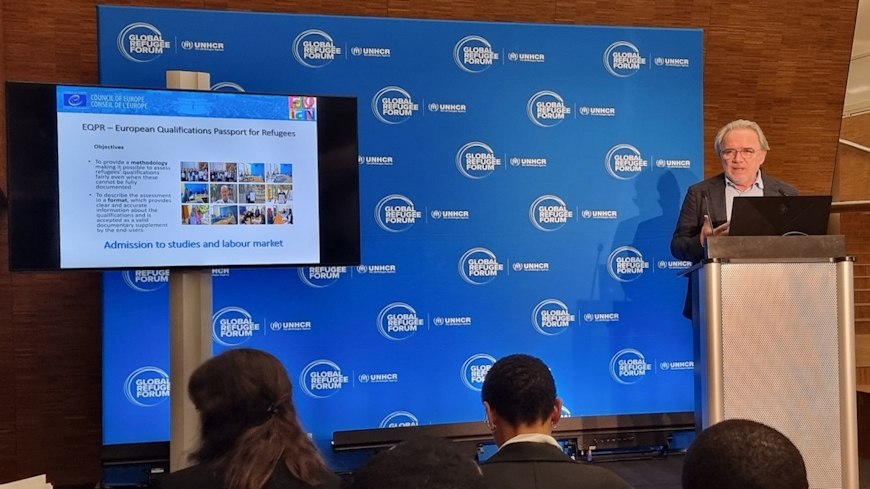At the UNHCR Global Refugee Forum held in Geneva, in a specific session dedicated to the sharing of best practices and achievements among national and international actors the Head of the Education Department of the Council of Europe Villano Qiriazi unveiled inspiring insights into the European Qualifications Passport for Refugees (EQPR), a groundbreaking initiative changing the landscape for refugees across Europe.
The EQPR initiative, rooted in principles of Fairness, Portability, Utility, and Shared European Responsibility, offers a ray of hope for refugees seeking to rebuild their lives. It embodies a commitment to providing equal opportunities for all refugees, regardless of their origin or the adversities they have faced. The EQPR centers on fairness, ensuring that each refugee's qualifications are assessed purely on merit, leveling the playing field and keeping their aspirations alive. This approach recognizes the potential of individuals who have faced significant disruptions in their academic or professional journeys.
With the concept of portability, the EQPR addresses the challenges faced by refugees in transit. The passport facilitates the mobility of academic and professional qualifications across multiple countries, aiding refugees in maintaining continuity and stability in their lives. Utility is another cornerstone of the EQPR, bridging the gap between qualification recognition and real-world application. It empowers refugees to employ their skills effectively in new communities, aiding in employment, further education, and societal integration.
Initiated in response to the urgent need for recognizing refugee qualifications without documentations, the EQPR has grown from a pilot project in 4 countries in 2017 to a significant initiative in 22 countries by 2023. Despite challenges, the project has seen remarkable progress, with some countries taking advanced steps in recognizing and providing formal decisions on refugee qualifications.The success of the EQPR is attributed to collaborations with national authorities, ministries of education, international organizations, and educational institutions. However, the most profound impact of the EQPR is on the individual lives of refugees, offering them a tool to unlock their potential, continue their education, pursue careers, and rebuild their lives with dignity.
As the EQPR continues to evolve, it stands as a symbol of what can be achieved through collective effort and a firm belief in the transformative power of education. It's not just about procedures and documentation; it's about changing lives, fulfilling dreams, and recognizing the resilience of the human spirit. The Head of the Education Department's speech in Geneva has reinforced the importance of this initiative, promising a more hopeful future for refugees across Europe. Project Webpage




